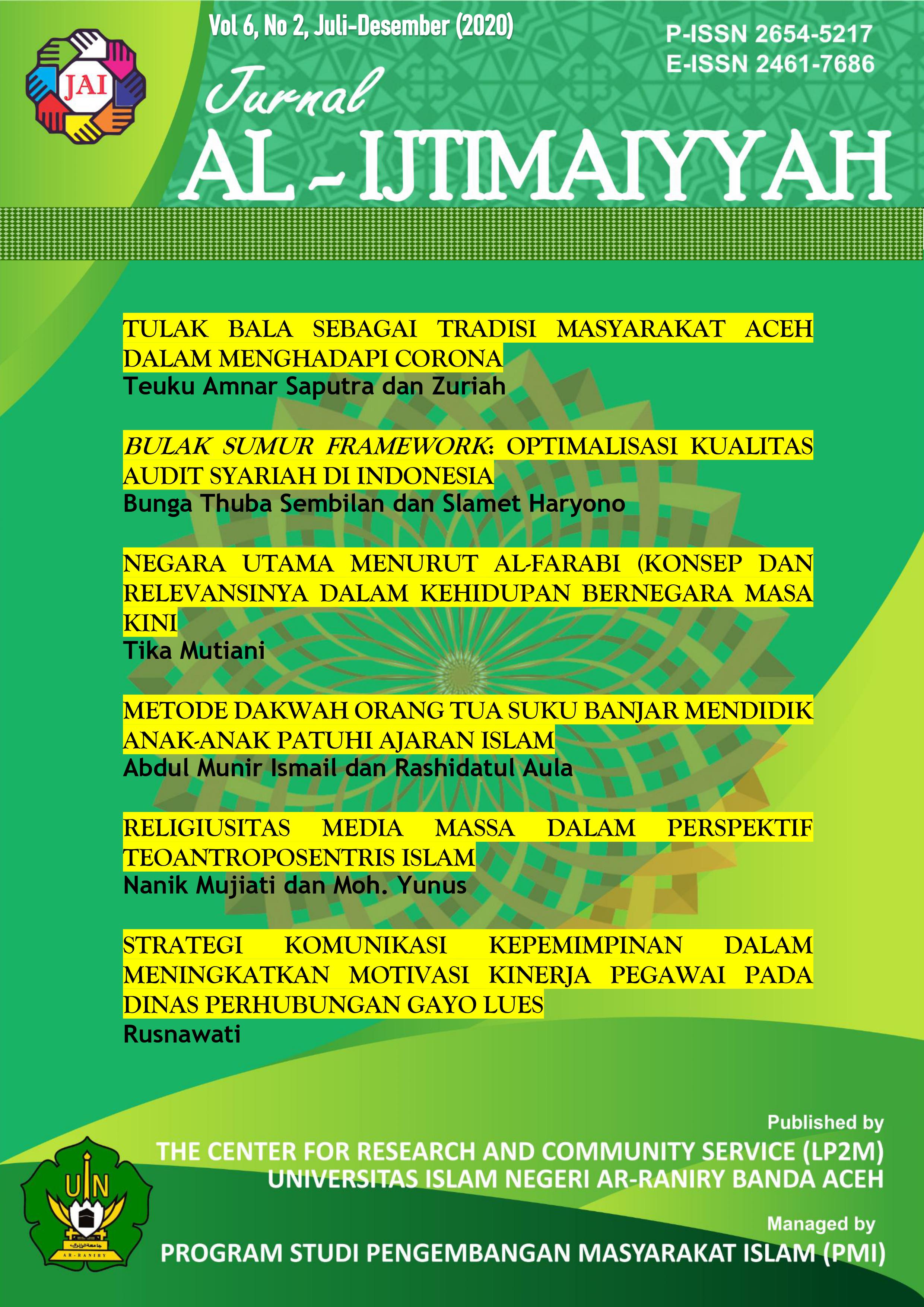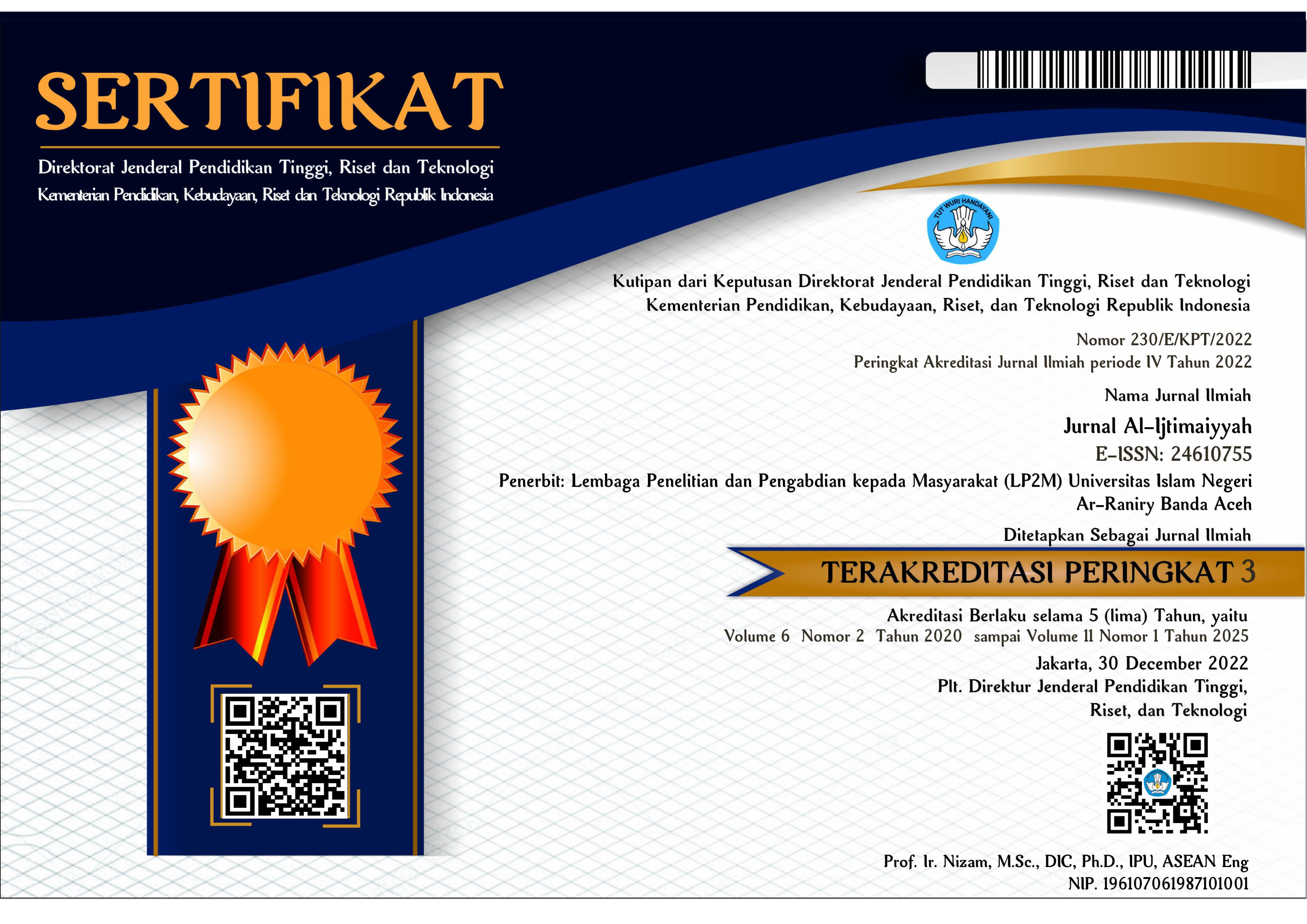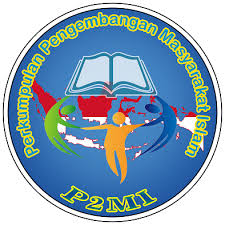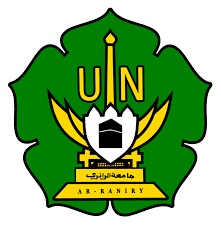NEGARA UTAMA MENURUT AL-FARABI (KONSEP DAN RELEVANSINYA DALAM KEHIDUPAN BERNEGARA MASA KINI)
DOI:
https://doi.org/10.22373/al-ijtimaiyyah.v6i2.6892Abstract
This reseach to find of understand the views of Islamic political philosopher Al-Farabi on the main country (al-madinah al-fadhilah). This method used of analysis description. This result reseach The country that is the mainstay of Medina is the State of Medina. first Al-Farabi had opinion that the main country is a country that conforms to the ideals of Islam. In Medina this is where the teachings of Islam are practiced perfectly, especially by following Islamic law both in the time of Prophet Muhammad and in the time of al-Khulafa al- Rasyidin. Second difficult to find the concept of country as exemplified by the Prophet Muhammad, the main ideal state.
Keywords: Al-Farabi, State, and al-Madinah al-Fadhilah.
Downloads
References
Ahmad Hanafi, Pengantar Filsafat Islam, Jakarta: Bulan Bintang, 1996.
Harun Nasution dan Azumardi Azra, Perkembangan Modern dalam Islam, Jakarta: Yayasan Obor, 1985.
Hesti Pancawati, “Pemikiran Al-Farabi Tentang Politik dan Negara”, Jurnal Aqalina: Jurnal Filsafat dan Teologi Islam, Vol. 9, No. 1, (2018): 73-110. http://jurnal.uinbanten.ac.id/index.php/aqlania/article/view/2063
Hidayatur Rohmah, “Konsep Negara Ideal (Studi Komparasi Antara Al-Farabi dan Ibnu Sina)”, Skripsi, Semarang: UIN Walisongo, 2015.
Mahmud Abdul Majid Zuhdi, Konsep Pemerintahan Islam dan Pendekatannya dalam Masyarakat Majemuk-Berdasarkan Al-Qur’an dan As-Sunnah”, Persidangan Pemerintahan dalam Masyarakat Majmuk, Kuala Lumpur: Institut Kepahaman Islam Malaysia, 1995.
Mahmuda, “Konsep Negara Ideal/Utama Menurut Al-Farabi,” Journal of Islamic Thought and Muslim Culture (IJITMC), Vol. 1, No. 2, (2019): 182-196.
Masykuri Abdillah, “Negara Ideal Menurut Islam dan Implementasinya Pada Masa Kini” dalam Komarudin Hidayat dan Ahmad Gaus AF, Islam Negara Civil Societ, Jakarta: Paramadina, 2005.
Muhammad Iqbal dan Amin Husein Nasution, Pemikiran Politik Islam, Jakarta: Prenadamedia Group, 2015.
Ramadhan Mustafa, Intisari Serah Muhammad bin Abdullah Saw, Kuala Lumpur: A.S. Noordeen, 1991.
Osman Bakar, Hierarki Ilmu: Membangun Rangka-Pikir Islamisasi Ilmu, Terj. Purwanto, Bandung: Mizan, 1997.
Said Abdullah, “Filsafat Politik Al-Farabi”, Indonesian Journal of Islamic Theology and Philosophy, Vol. 1, No. 1, (2019): 63-78. DOI: https://doi.org/10.24042/ijitp.v1i1.4097
Umar Amir Hosein, Kultur Islam, Jakarta: Bulan Bintang, 1975.
Yamani, Filsafat Politik Islam; Antara Al-Farabi dan Khomeini, Bandung: Mizan, 2002.
Zainal Abidin Ahmad, Negara Utama, Jakarta: Kinta, 1968.
Downloads
Published
Issue
Section
License
Copyright (c) 2020 Tika Mutiani

This work is licensed under a Creative Commons Attribution-ShareAlike 4.0 International License.
Authors who publish in Jurnal Al-Ijtimaiyyah agree to the following terms:
- Authors retain copyright and grant the journal right of first publication with the work simultaneously licensed Attribution-ShareAlike 4.0 International (CC BY-SA 4.0) that allows others to share the work with an acknowledgment of the work's authorship and initial publication in this journal.
- Authors are able to enter into separate, additional contractual arrangements for the non-exclusive distribution of the journal's published version of the work (e.g., post it to an institutional repository or publish it in a book), with an acknowledgment of its initial publication in this journal.
- Authors are permitted and encouraged to post their work online (e.g., in institutional repositories or on their website) prior to and during the submission process, as it can lead to productive exchanges, as well as earlier and greater citation of published work. (See The Effect of Open Acces)










